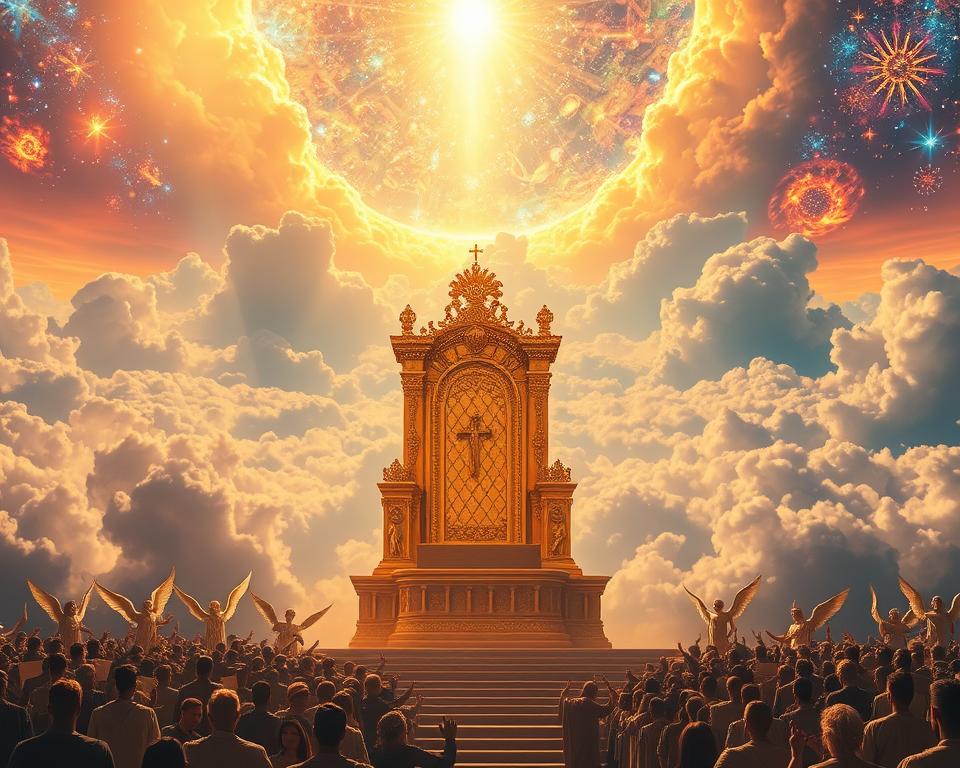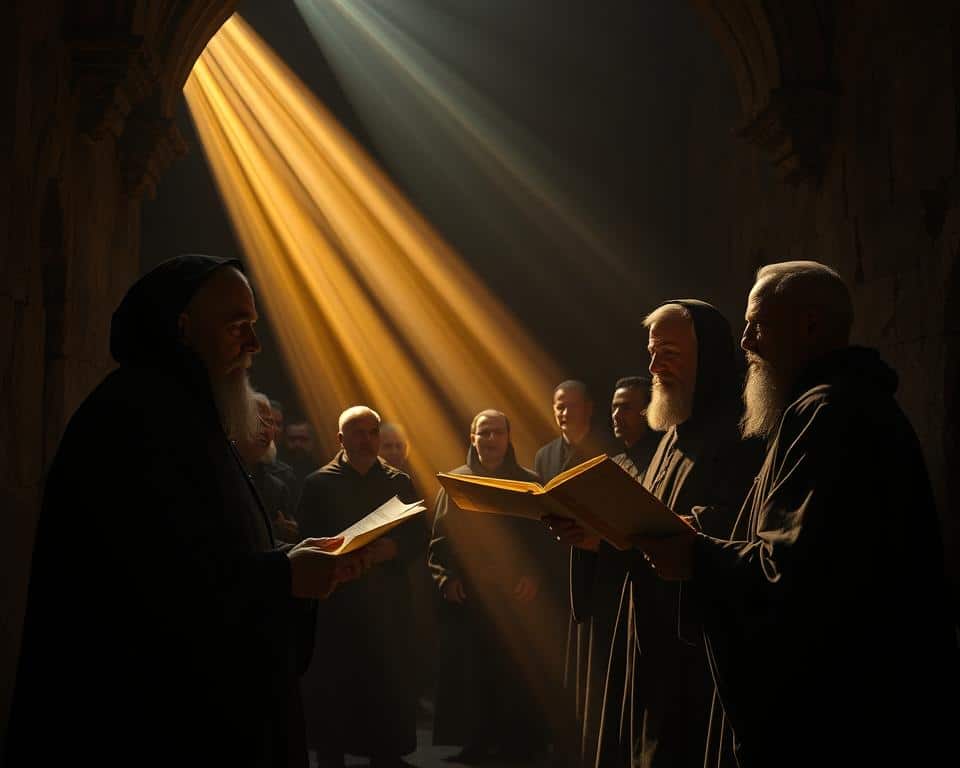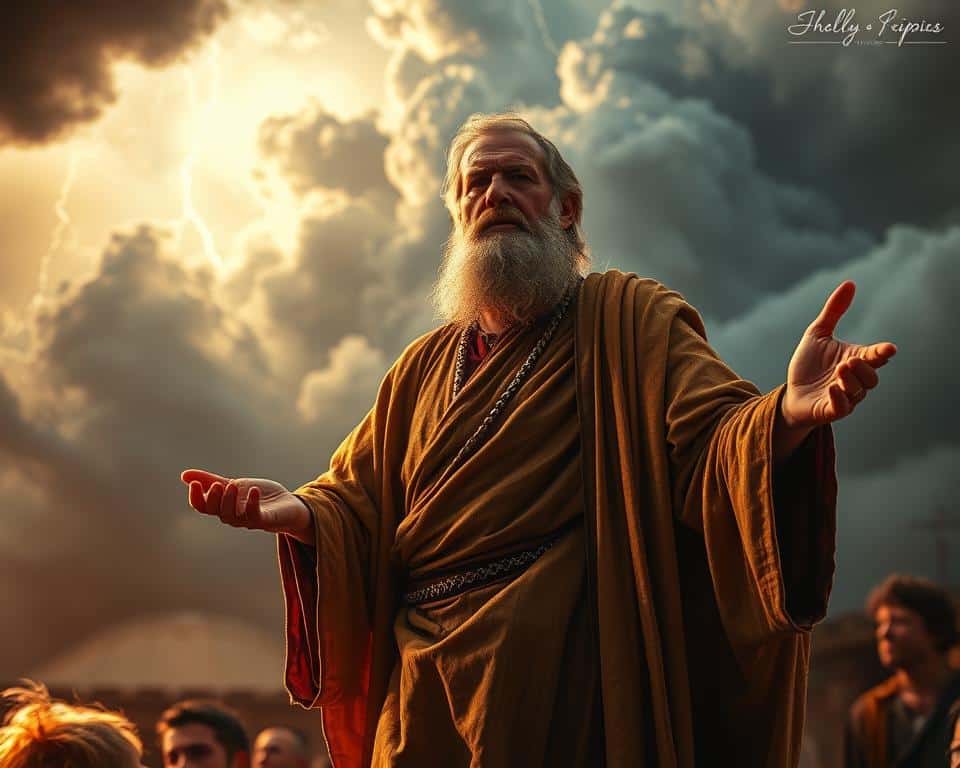Have you ever wondered if divine promises last forever? Scripture reveals a timeless truth: the Creator’s reign over earth remains unshaken, even when life feels chaotic. From Genesis to Revelation, the Bible paints a hopeful picture—a restored world under righteous leadership.
Ancient Israel’s exile seemed to shatter hope. Yet prophets like Isaiah and Jeremiah pointed to a future where a descendant of David would fulfill humanity’s original purpose. This wasn’t just about land; it was about God’s faithfulness to His word.
Today, we see this promise alive in Christ. The New Testament ties these threads together, showing how every prophecy finds its “yes” in Him. The kingdom isn’t lost—it’s coming.
Understanding God’s Eternal Kingdom
What does it mean for the Creator to rule over all things? Scripture paints a vivid picture: His authority spans galaxies, yet tenderly guides every detail. Unlike fleeting human empires, His reign brings perfect justice and unshakable peace.
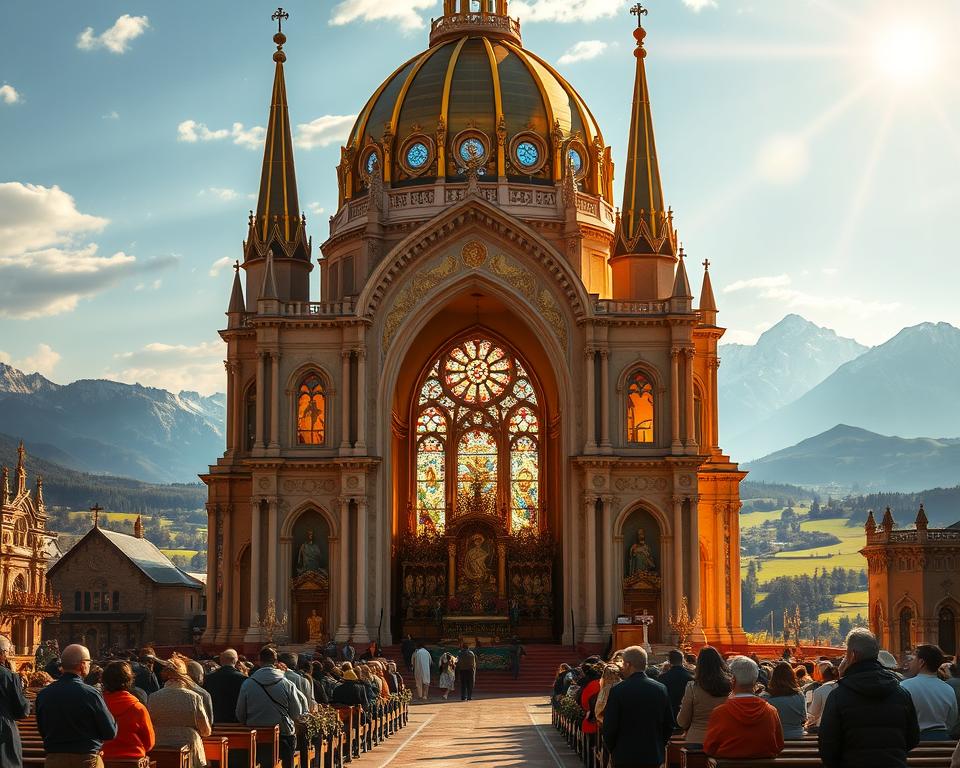
The Biblical Definition of Divine Rule
Isaiah 40:9–11 reveals a shepherd-ruler who “gathers the lambs in His arms.” This isn’t distant control—it’s intimate care. The kingdom god establishes isn’t a territory; it’s His sovereign will shaping earth and heaven.
Human governments falter under corruption. But divine governance corrects every wrong. “He will reign forever,” declares Revelation 11:15. No election cycles. No borders. Just endless grace.
Earthly Kingdoms vs. Divine Authority
Kings rise and fall. Laws change. Yet the Creator’s promises stand firm. Adam’s sin fractured humanity’s stewardship, but the kingdom god restores His original design—people under His care, earth renewed.
“His dominion is an everlasting dominion.”
One day, every knee will bow. Until then, we glimpse His reign through acts of love—proof that His kingdom is both here and coming.
Prophecies About God’s Kingdom in the Old Testament
Long before Christ walked the earth, faithful voices spoke of a coming reign. The old testament reveals how divine promises shaped Israel’s hope—and ours today.
Isaiah’s Vision of the Coming Kingdom
Imagine a desert bursting with life. Isaiah 35:1–10 paints this picture: crooked paths made straight, and a “highway of holiness” for the redeemed. This wasn’t just poetic—it pointed to Christ’s mission.
Isaiah 52:7–10 ties it together: “How beautiful are the feet of those who proclaim salvation!” The prophets saw beyond exile to a day when all nations would worship.
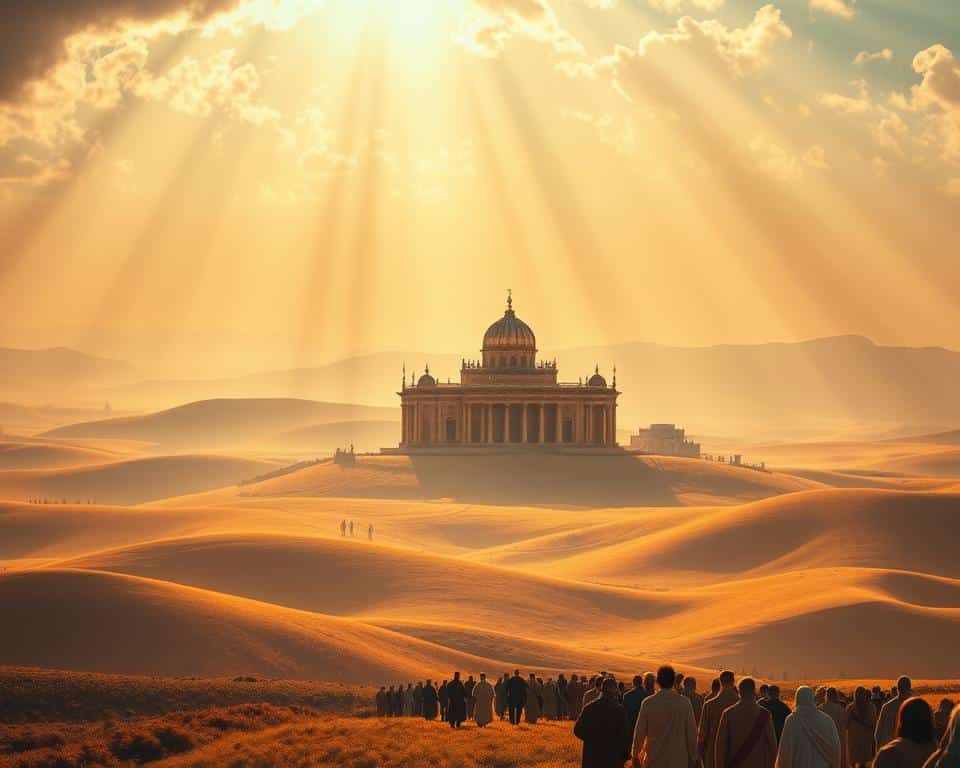
Daniel’s Prophecy of an Everlasting Dominion
Babylon’s empire crumbled. Persia fell. Yet Daniel 2:44 promised a kingdom “that will never be destroyed.” Human power fades; divine dominion stands firm.
“The God of heaven will set up a kingdom that will never be abandoned.”
Habakkuk 2:14 echoes this: “The earth will be filled with the knowledge of the Lord’s glory.” Every prophet agreed—hope isn’t lost. It’s guaranteed.
The Role of Israel in God’s Kingdom
Israel’s story isn’t just history—it’s a blueprint for hope. From Abraham’s call to the exile’s refining fire, this nation carried a divine purpose. Their journey shows how the Creator works through people to fulfill His promises.
God’s Covenant with David
2 Samuel 7:16 made an unbreakable vow: David’s line would produce a king whose reign never ends. This wasn’t about power—it was about presence. The Messiah would come to restore what sin broke.
Centuries later, Jesus fulfilled this. He wasn’t just another ruler. He was the Shepherd-King Isaiah foretold, gathering His people with love.
The Exile and the Hope for Restoration
Babylon’s invasion shattered Israel. Yet Jeremiah 23:3–4 promised: “I will shepherd My people.” Exile purified them, but hope remained. Even when they returned to their land, Ezra 3:12–13 reveals the temple’s inadequacy—pointing to Christ.
“I will bring them back to their homes.”
Israel’s role? To be a light. Through them, all nations would see the Creator’s faithfulness. Today, that light shines brightest in Jesus.
The New Exodus and God’s Deliverance
The Bible paints a path where deliverance meets destiny. Just as Israel walked from Egypt, Isaiah foretold a greater journey—one where hearts, not just feet, move toward freedom.
Isaiah’s Highway of Holiness
Isaiah 35:8–10 describes a sacred way where only the redeemed travel. Unlike the wilderness wanderings, this road leads straight to joy. You’ll notice two key differences from the Exodus:
- Purpose: Not escape from Pharaoh, but restoration to the Creator
- Path: Not physical wilderness, but a spiritual path to salvation
The “highway of holiness” symbolizes purified worship. Every stone points to Christ, who said, “I am the way” (John 14:6).
Zion’s Prophetic Restoration
Jerusalem’s ruins seemed hopeless after exile. Yet Zechariah 14:9 declares: “The Lord will be king over the whole earth.” This isn’t just about buildings—it’s about the glory of divine presence returning.
“Many nations will come and say, ‘Let us go up to the mountain of the Lord.’”
Ezekiel 34:26–27 ties this to nature’s renewal—abundant harvests signaling the kingdom’s arrival. These signs culminate in Revelation’s promise: “No longer will there be any curse” (22:3).
The Messiah’s Suffering and Victory
Why would a victorious king choose suffering? Scripture reveals a paradox—the Messiah’s path to glory required sacrifice. His death wasn’t defeat; it was the key to eternal triumph.
Isaiah 53: The Suffering Servant
Isaiah 53:6 declares, “The Lord laid on Him the iniquity of us all.” This wasn’t just poetic—it fulfilled the sacrificial system. The Servant’s wounds healed humanity’s brokenness.
Jewish scholars debated this passage for centuries. Yet Jesus embodied it, bearing sin’s weight to restore our relationship with the Creator. His suffering wasn’t random—it was redemption’s price.
Daniel 7: The Triumphant Son of Man
Daniel 7:13–14 shifts the scene: a “son of man” approaches the Ancient of Days, receiving eternal dominion. This son isn’t just a figure—He’s Christ, crowned after Calvary.
“His kingdom will never be destroyed.”
John 6:15 shows how even Jesus’ followers misunderstood. They wanted a political king, but He offered something greater—a throne built on love, not force.
The Gospels connect these threads. Jesus quoted Daniel when claiming authority (Mark 14:62). His crucifixion wasn’t Plan B—it was the word fulfilled. Through loss came victory.
Revelation 5:12 echoes this: “Worthy is the Lamb who was slain!” The Messiah’s suffering and reign aren’t opposites—they’re inseparable. His scars prove His right to rule.
Jesus Christ and the Kingdom of God
When Jesus stepped onto the scene, He didn’t just preach—He proclaimed a divine shift. “Repent, for the kingdom of heaven is at hand” (Matthew 3:2). This wasn’t a distant hope. It was an invitation to live differently now.
The Kingdom Announced
Jesus’ words fulfilled centuries of waiting. Prophets like Micah foretold His birth in Bethlehem (Micah 5:2). Zechariah 9:9 pictured Him riding a donkey—a scene repeated on Palm Sunday. Every detail pointed to one truth: the promised ruler had arrived.
Even Simeon, an elderly man in the temple, recognized Him. “My eyes have seen Your salvation,” he declared (Luke 2:30). The new testament era had begun.
Prophecies Fulfilled in Action
Jesus’ miracles weren’t just displays of power. They were kingdom previews. Healing the sick? Restoring creation. Feeding thousands? Revealing abundance. Each act showed what divine rule looks like.
“The Lord God will give Him the throne of His father David.”
Even the Lord’s Prayer centers on this: “Hallowed be Your name, Your kingdom come” (Matthew 6:9–10). It’s a daily reminder—His reign transforms everything.
Today, we live in that tension. The kingdom is here, yet its fullness awaits the future. But Jesus’ words still ring true: “Follow Me.”
The Kingdom of God in the Gospels
Jesus often used everyday objects to explain divine truths. His parables in Matthew 13 peel back layers of mystery, showing how the kingdom operates differently than earthly rule. From seeds to hidden treasure, each story reveals a facet of His reign.
Parables About the Kingdom
The mustard seed illustrates surprising growth. Though tiny, it becomes a shelter for birds (Matthew 13:31–32). Christ’s point? His kingdom starts small but transforms the earth.
Then there’s the treasure hidden in a field. A man sells everything to claim it (Matthew 13:44). This isn’t about greed—it’s about recognizing Christ’s surpassing value. Worldly systems pale next to His power to redeem.
The Lord’s Prayer and God’s Reign
“Your kingdom come” (Matthew 6:10) isn’t just a hopeful phrase. It’s a daily surrender. The Beatitudes expand this: the poor in spirit, the meek—they’re citizens of His upside-down reign.
“Blessed are the pure in heart, for they will see God.”
Pharisees expected flashy signs. Jesus modeled servant-leadership—washing feet, eating with sinners. His work redefined authority. Today, we join this story, living as kingdom people in a broken world.
The Kingdom of Heaven vs. the Kingdom of God
Jewish tradition shaped how Matthew described the Messiah’s reign. You’ll notice he uses “kingdom heaven” 30+ times, while Mark and Luke say “god kingdom.” Both phrases point to the same reality—divine authority breaking into our world.
Matthew’s Reverence for Divine Names
Matthew wrote for Jewish readers who avoided saying God’s name directly. Instead of “god kingdom,” he used “heaven” as a respectful substitute. Compare parallel passages:
- Matthew 19:23–24: “Hard for a rich man to enter the kingdom heaven.”
- Mark 10:23–25: “How hard to enter the god kingdom!”
One Reign, Two Phrases
Theological debates arise—are these separate kingdoms? Scripture clarifies: both terms describe Christ’s rule. Jesus Himself linked them, preaching “the kingdom is near” (Matthew 4:17) while demonstrating God’s power.
“The Lord will reign over all the earth in those days.”
Dispensational views suggest phases, but the core truth remains: heaven’s rule transforms earth. Whether Matthew’s phrasing or Luke’s, the invitation stands—live today under His authority.
The Unprophesied Kingdom in Paul’s Letters
Paul’s letters unveil a divine plan hidden for ages. While prophets spoke of Israel’s restoration, Ephesians 3:5–9 reveals a stunning twist—the church as Christ’s unified body. This wasn’t secrecy; it was a revelation awaiting its moment.
The Mystery of the Church
In Scripture, a “mystery” isn’t a riddle—it’s truth once concealed, now revealed. Israel’s promises centered on land, but the church transcends borders. Colossians 1:13 declares we’re already “transferred into the kingdom of His dear Son.”
How? Through Christ’s victory. Ephesians 2:6 says believers are “seated with Him in heavenly places.” Unlike earthly kingdoms, this authority isn’t political—it’s relational.
Grace Fuels Kingdom Living
Paul’s teachings on grace redefine power. Human effort fails, but divine favor empowers. Romans 5:17 captures it: “Those who receive grace reign in life.”
“Now to Him who can do immeasurably more than we ask or think.”
Grace isn’t passive; it’s the fuel for love, service, and hope. As the body of Christ, we live the kingdom now—until its fullness comes.
The Future Restoration of Israel
Imagine a nation reborn—not just in land, but in heart. Scripture reveals a future where Israel’s restoration goes beyond borders. It’s about a people transformed by divine promise.
Ezekiel’s Vision of a New Heart and Spirit
Ezekiel 11:19–20 speaks of a radical change: “I will give them an undivided heart and put a new spirit within them.” This wasn’t about politics—it was about purity. The prophet foresaw Pentecost, where hearts ignited with faith.
Modern Israel’s 1948 reestablishment was significant. Yet Ezekiel’s words point deeper—to Christ’s work in cities and souls. The true restoration? A people aligned with the Creator’s will.
Jeremiah’s Promise of Shepherds for God’s People
Jeremiah 23:3–4 delivers hope: “I will place shepherds over them who will tend them.” Jesus fulfilled this, calling Himself the Good Shepherd (John 10:11). His leadership isn’t territorial—it’s relational.
“They will no longer be afraid or terrified, nor will any be missing.”
Romans 11:25–26 hints at a broader plan—the “fullness of the Gentiles” before all Israel is saved. This isn’t exclusion; it’s divine timing. Our hope for all believers rests in this promise.
The Millennial Reign of Christ
The Bible’s final book unveils a reign unlike any other. Revelation 20:4–6 describes a thousand-year era where Christ governs with perfect justice. This isn’t symbolic—it’s the fulfillment of ancient hopes.
Revelation’s Vision of Perfect Rule
Satan’s binding (Revelation 20:1–3) marks the start. No more deception. No more war. Isaiah 2:4’s prophecy of turned swords into plowshares becomes reality. Earth finally breathes peace.
Some see this as literal (premillennial), others as spiritual (amillennial). Yet both agree: Christ’s authority transforms everything. The curse lifts—Revelation 21:22 shows worship without temples, for the Lord Himself is present.
The Davidic Promise Fulfilled
2 Samuel 7:16’s oath finds its climax here. Jesus, David’s descendant, rules eternally. The davidic covenant wasn’t about land—it pointed to this unshakable reign.
“They will be priests of God and of Christ and will reign with Him.”
Imagine a world where leaders don’t fail. Where love outlasts time. That’s the revelation of Christ’s millennial rule—a foretaste of eternity.
A World Transformed: Prophecies of Peace
Conflict fades into history when divine peace takes center stage. Scripture reveals a future where nations beat swords into plows and wolves live with lambs. This isn’t fantasy—it’s the Creator’s blueprint for restoration.
Micah’s Vision of Nations at Peace
Micah 4:3–4 mirrors Isaiah’s mountain imagery. Weapons become farming tools, and war colleges shut down. The prophet’s words aren’t just poetry—they’re a roadmap to reconciliation.
Today’s conflicts feel endless. Yet Micah’s vision points to Christ, who taught, “Blessed are the peacemakers” (Matthew 5:9). His kingdom turns enemies into neighbors.
Isaiah’s Prophecy of Animal Harmony
Isaiah 11:6–9 describes a lion eating straw like an ox. This isn’t biology rewritten—it’s nature restored to Eden’s harmony. Predators and prey coexist because sin’s curse lifts.
“The earth will be filled with the knowledge of the Lord.”
Amos 9:13–14 ties this to environmental healing. Barren lands bloom, mirroring the heart-change Jesus brings. The kingdom isn’t just coming—it’s already here in glimpses.
Abundance and Healing in God’s Kingdom
Picture fields so fertile that harvests never end. Scripture reveals a future where healing and abundance redefine life. From overflowing harvests to bodies made whole, divine promises restore the land and its people.
Agricultural Blessings in Amos and Ezekiel
Amos 9:13–14 describes a harvest so rich, the plowman overtakes the reaper. This isn’t just productivity—it’s a sign of the Creator’s original intent for creation. Every seed reflects His faithfulness.
Ezekiel 34:26–27 adds detail: “Showers of blessing” revive barren land. Notice how these promises mirror Eden—where work was joyful, and earth yielded freely. Christ’s miracles, like feeding thousands, preview this reality.
Physical and Spiritual Healing in Isaiah
Isaiah 35:5–6 foretells eyes opened and lame leaping. Jesus fulfilled this, healing the sick as proof of His authority. But the deeper message? Brokenness—physical and spiritual—meets divine power.
“He forgives all your sins and heals all your diseases.”
Revelation 21:4 completes the picture: “No more death or pain.” The healing Isaiah described points to eternity, where abundance isn’t seasonal—it’s eternal.
The Eternal Reign of God’s Kingdom
Human rulers fade, but divine authority stands firm. Isaiah 9:7 declares a government with “no end”—a reign marked by justice and peace. Unlike earthly powers, this dominion isn’t bound by time or borders.
Daniel 7:14 and Revelation 11:15 echo this truth: His rule lasts forever. 1 Corinthians 15:24–28 reveals the climax—Christ delivering a perfected kingdom to the Father. Every tear, every struggle finds resolution here.
Revelation 22:3–5 paints the final scene: nations healed, worship purified. The tree of life flourishes, and His light replaces the sun. This isn’t a distant dream—it’s our certain hope.
You’re invited. Through faith, we join this unshakable glory. Today’s choices ripple into eternity. Will you live as a citizen of His endless reign?

